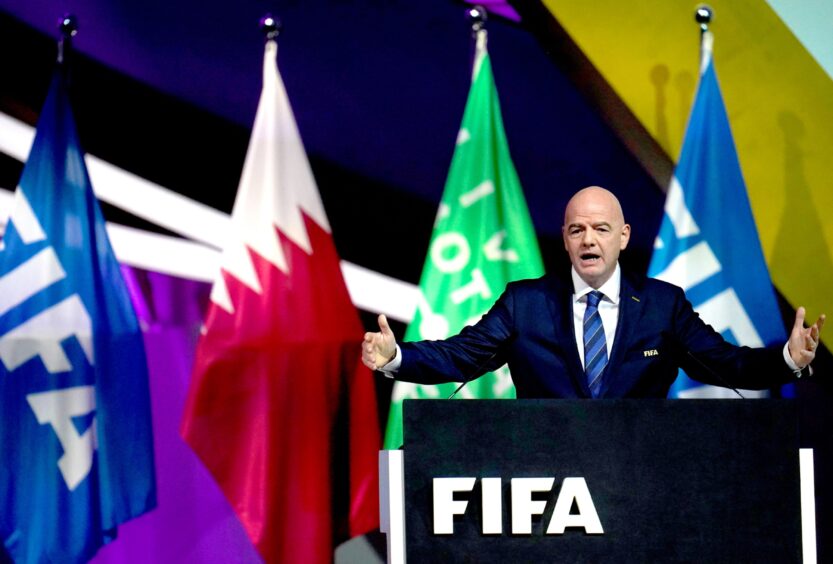
Scotland’s only openly gay footballer, Zander Murray, says the decision to award Saudi Arabia the 2034 Men’s World Cup is an opportunity for Fifa and Middle East countries to begin “meaningful conversations” about the human rights of LGBT people.
Zander, who came out as gay in 2022, is committed to shining a spotlight on draconian laws in Saudi, where same-sex partnerships have been punished by lashing or execution.
Fifa, the game’s governing body, was roundly criticised this week after president Gianni Infantino awarded the Gulf country football’s most garlanded competition, with Amnesty International saying the “reckless” move will “put many lives at risk”.
Murray, 33, was shocked by the announcement, but knows the decision won’t be reversed, and has instead committed to highlighting the country’s dire human rights record and imploring its government to change.
The Glasgow-born striker, who retired from football this year, said: “People say things like, ‘Just abide by their rules and it’ll be fine’. But the difference between a gay football fan and a straight football fan going over there is that the straight person has basic human rights. We don’t. Our existence is punishable by death. Theirs isn’t.
“The Saudis have said it will be safe for LGBT fans but look at their current laws. Last year in Saudi they even banned rainbow clothing, hair clips, toys because they think it encourages homosexuality. In 2023.
“I grew up in the east end of Glasgow and I didn’t see any gay people. I realised I was gay when I was a teenager. It had nothing to do with rainbows. Rainbows don’t make you gay, but it shows you the way some people think in that country.”
Saudi Arabia has no codified criminal law and adheres to Sharia Law. Men who are found, or even suspected, to have engaged in relationships with other men have been subject to lashings or beheadings.
Both the Scottish and English FAs supported Fifa’s decision, and the world governing body say they have been given assurances that fans will be “made safe and welcome”.
But Murray said: “I have heard that many Saudi people are very hospitable from people who have travelled there. But would I feel safe going over there for the World Cup? Probably not.
“Out Leadership (a global LGBT rights organisation) found 40% of Saudis felt homosexuality was a crime, and 50% would feel uncomfortable if their neighbour was LGBT. I would feel uncomfortable going.”
At the 2022 World Cup in Qatar, another Gulf country with strict anti-homosexuality laws, Germany flew to the competition in a plane bearing a “diversity wins” slogan, while the US national side changed their team logo from red, white and blue to rainbow colours at their HQ.
But Murray thinks recent refusal to wear rainbow items by players such as Sheffield United’s Anel Ahmedhodzic, Manchester United’s Noussair Mazraoui and Ipswich Town’s Sam Morsy is a distraction to the pursuit of equality. He said: “The rainbow laces campaign played a huge part, but I think things have to evolve beyond the waving of rainbow flags and clubs putting rainbow banners around their grounds.
“We might get further between now and 2034 if we stir up meaningful conversations so that people in power might listen and change.”
Since going public about his sexuality, Murray, who played for Airdrie, Motherwell and Bonnyrigg Rose before retiring last season, has toured Scottish football giving lectures to youth squads.
He has plans to expand his lecture workshops into the English Premiership.
He said: “I didn’t see any representation and was experiencing a real internal battle. I couldn’t comprehend how I could be gay and have a future in football. I was in the closet for years. Now I’m at the other side of that I just want to give back.”
He added: “If there was an out player like me playing in Saudi Arabia then it might cause an outrage, but it might lead to a realisation that they should just let the boy play football.”

Enjoy the convenience of having The Sunday Post delivered as a digital ePaper straight to your smartphone, tablet or computer.
Subscribe for only £5.49 a month and enjoy all the benefits of the printed paper as a digital replica.
Subscribe © Nick Potts/PA Wire
© Nick Potts/PA Wire